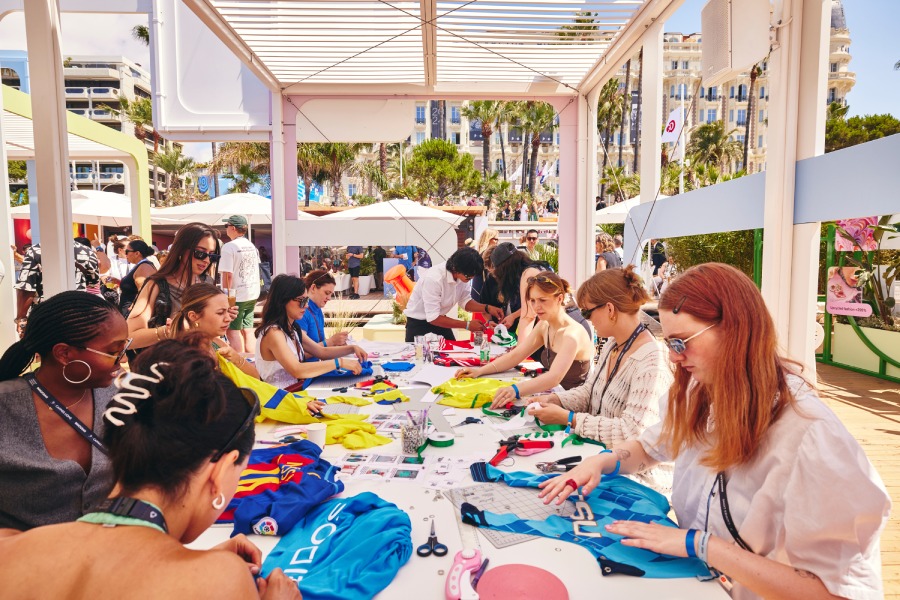In Term Sheet, we typically report on investments in companies, whether it be through venture capital, private equity, or hedge funds. But today’s newsletter covers another kind of funding with an entirely different value proposition—investments in communities, and the mental health of the young people living in them.
One-third of young adults in the U.S. aged 18 to 25 live with a mental illness, according to a 2022 report from the U.S. government agency that oversees mental health treatment services. One in ten young people in the same age group experience a serious mental illness, which means it substantially interferes with their daily life, the data showed.
While discussions around mental health have entered the mainstream in recent years, minority communities face additional barriers to getting access to proper care. Researchers have found that the stigma around mental health is worse for ethnic minorities, for example. Black individuals with mental health or substance use illnesses endure longer wait times for appointments than white patients, and they are at a higher risk for financial distress when they have depression, studies have found. There is also a disproportionately low number of psychology workers that come from ethnic minorities compared to the makeup of the U.S. population.
Social media platform Pinterest, alongside Paramount-owned entertainment networks Showtime and MTV Entertainment Group, have committed $1 million towards funding community organizations working on culture-based mental health initiatives for young people, the companies exclusively told Fortune.
What exactly is a culture-based mental health practice? The definition is loose, but it can include food, dance, music, meditation, yoga, comedy, and other activities rooted in cultural traditions that promote healing. The fund, called the Hidden Healing Fund, also intends to support groups that are bridging the gap of accessibility in mental health care for minority communities, such as the AAKOMA Project, a nonprofit that offers free therapy sessions to members of marginalized groups.
“This really felt like something new and different that merited our investment,” Erika Soto Lamb, MTV’s vice president of social impact strategy, told Fortune. “Even if you can access mental health care, the disparity of therapists coming from communities of color makes it so it’s difficult to find care from somebody with lived experience.”
Pinterest’s chief content officer Malik Ducard pointed to his own industry as a reason mental health care is in demand. In recent years, the negative effects of social media on mental health have become clearer, with the Surgeon General issuing a warning to social media companies on the matter last year. Meanwhile, Pinterest supports emotional wellbeing initiatives and works to create a healthier product for young people, Ducard said in an emailed statement.
The fund wasn’t born from nothing. In 2022, MTV held a mental health-focused forum at the White House. In attendance were 30 health leaders under the age of 30, who pitched ideas on what resources young people need to a group of media companies, nonprofits, and officials from the Biden-Harris Administration. Four of those participants—Mahmoud Khedr, Ayanna Kelly, Maddox Guerilla, and Kheira Bekkadja—proposed diverse healing practices and called themselves the Hidden Healers.
“We always went in with a commitment that we were going to do more with at least one of the ideas,” MTV’s Soto Lamb said. “This one stood out to us from the start.”
Within days of the event, MTV partnered with the Hidden Healers group. Together, they created an online resource page for members of underrepresented communities. The new fund builds off this previous work with the original group as its namesake.
While the $1 million fund is a step in the right direction, it is still just a drop in the bucket compared to the deep pockets of these media companies and the scope of the problem. Paramount generated $30 billion in revenue last year, and Pinterest conjured $3 billion.
Soto Lamb didn’t disclose the number of organizations the Hidden Healing Fund intends to invest in or whether the media companies will continue infusing money into the project past its inaugural year. But she did say, “When we do something that works, we keep doing it.”
With young people as the future of business (and not to mention politics, academia, science, journalism, and everything else), perhaps taking a stake in improving mental health is the only investment that matters.
Rachyl Jones
Twitter: @RachylJones
Email: rachyl.jones@fortune.com
Submit a deal for the Term Sheet newsletter here.
Joe Abrams curated the deals section of today’s newsletter.
VENTURE DEALS
– Relay, a Toronto, Canada and New York City-based business banking platform and money management platform, raised $32.2 million in Series B funding. Bain Capital Ventures led the round and was joined by Industry Ventures and existing investors BTV, Garage, and Tapestry.
– Firefly, a Tel Aviv, Israel and Foster City, Calif.-based platform designed for managing multi-cloud operations, raised $23 million in Series A funding. Vertex led the round and was joined by Hanaco, SoftBank, InMotion Ventures, and Redseed.
– Maven AGI, a Boston, Mass.-based company developing generative AI designed for customer support, raised $20 million in Series A funding. M13 led the round and was joined by Lux Capital, E14 Fund, and others.
– Odyssey, a New York City-based platform that partners with states to administer school choice programs for parents, raised $10 million in Series A funding. Bradley Tusk of Tusk Venture Partners led the round and was joined by Andreessen Horowitz, Cubit Capital, and Bling Capital.
– Everfence, a Newport Beach, Calif.-based platform designed to connect homeowners and contractors for fencing projects, raised $7 million in Series A funding. From HIPstr, the investment arm of HighPost Capital.
– SCRYPT, a Zürich, Switzerland-based provider of crypto asset financial services, raised $5 million in funding. Braza Bank led the round and was joined by Funfair Ventures, Cabrit Capital, and Atlantic Labs.
– Juicy Button Games, a Limassol, Cyprus-based games studio, raised $3 million in seed funding. The Games Fund led the round and was joined by TGF and Anton Sinelnikov.
PRIVATE EQUITY
– GTCR agreed to take Surmodics (NASDAQ: SRDX), an Eden Prairie, Minn.-based developer of medical device and in vitro diagnostic technologies, private for approximately $627 million.
– Hudson Glade acquired Quality First Home Improvement, a Sacramento, Calif.-based home services provider. Financial terms were not disclosed.
– JENNMAR, a portfolio company of FalconPoint Partners, acquired a majority stake in Australian Steel & Wire, a Henderson, Australia-based manufacturer of wire mesh and related products. Financial terms were not disclosed.
– Dominus Capital acquired a majority stake in Safe Haven Defense, a Scottsdale, Ariz.-based provider of bullet-resistant window film. Financial terms were not disclosed.
– Suja Life, backed by Paine Schwartz Partners, acquired Slice, a Newtown, Pa.-based soda brand. Financial terms were not disclosed.
EXITS
– Merck (NYSE: MRK) agreed to acquire EyeBio, a London, U.K.-based developer of therapies for eye diseases, from Jeito Capital, for up to $3 billion.
– Bridgepoint Group acquired a majority stake in LumApps, a Tassin, France-based intranet provider, from Goldman Sachs Alternatives, Eurazeo Growth, Bpifrance, and IRIS for $650 million.
IPOS
– Gauzy, a Tel Aviv, Israel-based developer of smart glass, camera monitor, and advanced driver assistance technologies, plans to raise up to $79.8 million in an offering of 4.2 million shares priced between $17 and $19. The company posted $78 million in revenue for the year ending December 31, 2023. Ibex Partners, Olive Tree Ventures, Infinity Holding Ventures PTE, Avery Dennison Corp, South Lake One, and Blue-Red Partners back the company.
PEOPLE
– Bessemer Venture Partners, a San Francisco-based venture capital firm, promoted Lindsey Li to vice president.
– Silas Capital, a New York City-based growth equity and venture capital firm, hired Mary Murtagh as a vice president on the investment team. Formerly, she was with CAVU Consumer Partners.
– MS&AD’s Transverse hired Matthew Jones as head of Transverse Ventures, the insurance company’s New York City-based venture and private equity investments unit. Formerly, he was with Anthemis Group.




